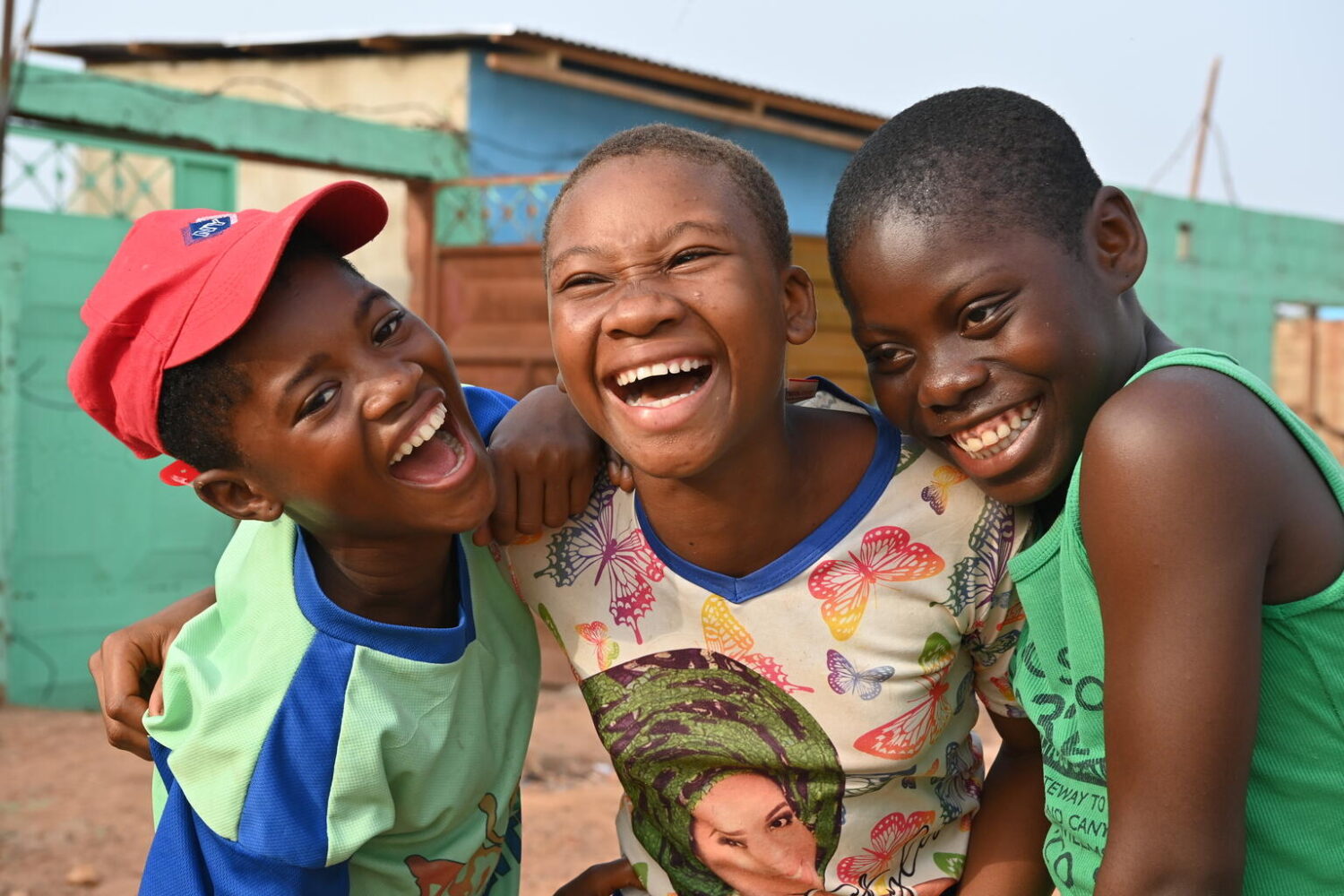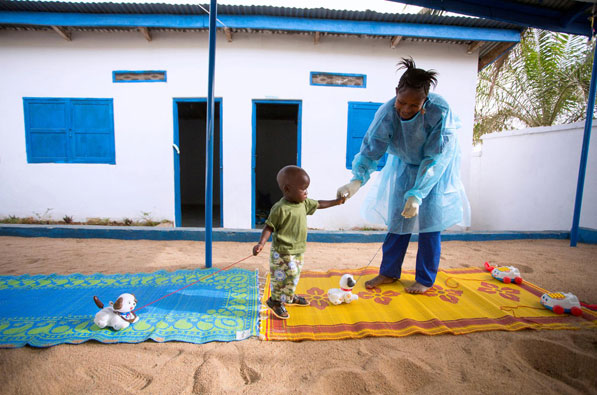
UNICEF, WHO, IFRC and MSF announce the establishment of a global Ebola vaccine stockpile
NEW YORK/ GENEVA, 12 JANUARY 2021: The four leading international health and humanitarian organizations announced today the establishment of a global Ebola vaccine stockpile to ensure outbreak response.
The effort to establish the stockpile was led by the International Coordinating Group (ICG) on Vaccine Provision, which includes the World Health Organization (WHO), UNICEF, the International Federation of Red Cross and Red Crescent Societies (IFRC), and Médecins Sans Frontières (MSF), with financial support from Gavi, the Vaccine Alliance. The stockpile will allow countries, with the support of humanitarian organizations, to contain future Ebola epidemics by ensuring timely access to vaccines for populations at risk during outbreaks.
The injectable single-dose Ebola vaccine (rVSV∆G-ZEBOV-GP, live) is manufactured by Merck, Sharp & Dohme (MSD) Corp. and developed with financial support from the US government. The European Medicines Agency licensed the Ebola vaccine in November 2019, and the vaccine is now prequalified by WHO, and licensed by the US Food and Drug Administration as well as in eight African countries.
Before achieving licensure, the vaccine was administered to more than 350,000 people in Guinea and in the 2018-2020 Ebola outbreaks in the Democratic Republic of the Congo under a protocol for “compassionate use”.
The vaccine, which is recommended by the Strategic Advisory Group of Experts (SAGE) on Immunization for use in Ebola outbreaks as part of a broader set of Ebola outbreak response tools, protects against the Zaire ebolavirus species which is most commonly known to cause outbreaks.
“The COVID-19 pandemic is reminding us of the incredible power of vaccines to save lives from deadly viruses,” said Dr Tedros Adhanom Ghebreyesus, WHO Director-General. “Ebola vaccines have made one of the most feared diseases on earth preventable. This new stockpile is an excellent example of solidarity, science and cooperation between international organizations and the private sector to save lives.”
UNICEF manages the stockpile on behalf of the ICG which, as with stockpiles of cholera, meningitis and yellow fever vaccines, will be the decision-making body for its allocation and release.
The stockpile is stored in Switzerland and ready to be shipped to countries for emergency response. The decision to allocate the vaccine will be made within 48 hours of receiving a request from a country; vaccines will be made available together with ultra-cold chain packaging by the manufacturer for shipment to countries within 48 hours of the decision. The targeted overall delivery time from the stockpile to countries is seven days.
“We are proud to be part of this unprecedented effort to help bring potential Ebola outbreaks quickly under control,” said Henrietta Fore, UNICEF Executive Director. “We know that when it comes to disease outbreaks, preparedness is key. This Ebola vaccine stockpile is a remarkable achievement – one that will allow us to deliver vaccines to those who need them the most as quickly as possible.”
As Ebola outbreaks are relatively rare and unpredictable, there is no natural market for the vaccine. Vaccines are only secured through the establishment of the stockpile and are available in limited quantities. The Ebola vaccine is reserved for outbreak response to protect people at the highest risk of contracting Ebola – including healthcare and frontline workers.
“This is an important milestone. Over the past decade alone we have seen Ebola devastate communities in West and Central Africa, always hitting the poorest and most vulnerable the hardest,” said IFRC Secretary General, Jagan Chapagain. “Through each outbreak, our volunteers have risked their lives to save lives. With this stockpile, it is my hope that the impact of this terrible disease will be dramatically reduced.”
“The creation of an Ebola vaccine stockpile under the ICG is a positive step”, said Dr Natalie Roberts, Programme Manager, MSF Foundation. “Vaccination is one of the most effective measures to respond to outbreaks of vaccine preventable diseases, and Ebola is no exception. An Ebola vaccine stockpile can increase transparency in the management of existing global stocks and the timely deployment of the vaccine where it’s most needed, something MSF has called for during recent outbreaks in the Democratic Republic of Congo.”
An initial 6,890 doses are now available for outbreak response with further quantities to be delivered into the stockpile this month and throughout 2021 and beyond. Depending on the rate of vaccine deployment, it could take 2 to 3 years to reach the SAGE-recommended level of 500,000 doses for the emergency stockpile of Ebola vaccines. WHO, UNICEF, Gavi and vaccine manufacturers are continuously assessing options to increase vaccine supply should global demand increase.
######
Download photos, b-roll from the links below:
- Video b-roll – Ebola vaccination in the Democratic Republic of the Congo, June 2019: https://who.canto.global/b/HBP7C
- Photo gallery: https://whohqphotos.lightrocketmedia.com/galleries/675/ebola-vaccine-stockpile
- Photos
Note – for media to access and download images from this gallery:
- Fill out the WHO Permissions Request Form mentioning the internal ID number of the image(s), coma separated
- Send an email to [email protected]with the ID number of the request. Within a few minutes you will be sent a download link
Click here for related links on Ebola virus disease or for the Ebola vaccines FAQ
About the International Coordinating Group (ICG) on Vaccine Provision
The ICG was established in 1997, following major outbreaks of meningitis in Africa, as a mechanism to manage and coordinate the provision of emergency vaccine supplies and antibiotics to countries during major outbreaks. The ICG works to improve cooperation and coordination of epidemic preparedness and response.
About Unicef
UNICEF is the world’s leading organisation for children and works in some of the world’s toughest places, to reach the world’s most disadvantaged children. Across more than 190 countries and territories, we work for every child, everywhere, to build a better world for everyone.
The United Kingdom National Committee for Unicef (Unicef UK) is one of 33 National Committees for UNICEF who support UNICEF’s mission in their territories. Unicef UK works tirelessly to raise funds for UNICEF and advocate for children’s rights in the UK and around the world. As a registered charity we raise funds through donations from individuals, organisations and companies and we lobby and campaign to keep children safe. Unicef UK also runs programmes in schools, hospitals and with local authorities and communities in the UK. Unicef UK is a charity, entirely funded by our supporters. It receives no money from the UN budget.
For more information please visit unicef.org.uk, or follow Unicef UK on Twitter, LinkedIn, Facebook and YouTube.
United Kingdom Committee for UNICEF is a registered charity 1072612 (England and Wales) and SC043677 (Scotland).
About WHO
The World Health Organization provides global leadership in public health within the United Nations system. Founded in 1948, WHO works with 194 Member States, across six regions and 150 offices, to promote health, keep the world safe and serve the vulnerable. Our goal for 2019-2023 is to ensure that a billion more people have universal health coverage, to protect a billion more people from health emergencies, and provide a further billion people with better health and wellbeing. For updates on COVID-19 and public health advice to protect yourself from coronavirus, visit www.who.int and follow WHO on Twitter, Facebook, Instagram, LinkedIn, TikTok, Pinterest, Snapchat, YouTube, Twitch
For more information, please contact:
WHO: [email protected]
UNICEF: 0207 375 6030, [email protected] Yemi Lufadeju, [email protected]
MSF: Assia Shihab, [email protected] / Francesco Segoni, [email protected].
IFRC: Matthew Cochrane, +41 79 251 80 39, [email protected]


